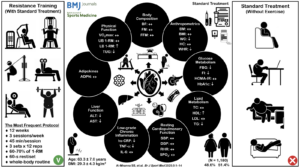Why is this study important?
Type 2 diabetes mellitus (T2DM) and obesity represent significant global public health concerns, contributing to the elevated morbidity and mortality associated with cardiovascular disease. Accordingly, sedentary individuals with T2DM and overweight/obesity commonly exhibit metabolic derangements and cardiovascular dysfunction as well as elevated visceral fat and abnormal lipid profiles.
Resistance training (RT) is commonly included in the exercise prescription guidelines for patients with T2DM, potentially conferring favorable physiological and clinical effects on cardiovascular disease and risk factors. Importantly, RT has been suggested as a safe and effective exercise strategy for combatting the metabolic health impairments associated with T2DM.
Although extensive data support the impactful role of regular moderate-to-vigorous aerobic exercise in mitigating cardiometabolic risk associated with obesity and T2DM, the extent to which RT alone can be considered an effective therapy for achieving complementary independent and additive benefits remains unclear.
How did the study go about this?
A systematic electronic search was undertaken to gather relevant reports from six databases, including a total of 20,266 studies. Randomized controlled trials (RCTs; n=18) investigating the effect of RT on a wide range of cardiometabolic health-related indices among patients with T2DM and concurrent overweight/obesity met the eligibility criteria and were included in the analysis. Data were extracted from 1,180 patients (49/51% women/men ratio; mean age: 63.3 ± 7.0 years; mean body mass index: 29.3 ± 4.3 kg/m2). Click here to view the full study.
What did the study find?
- RT induces beneficial alterations in several cardiometabolic health indices compared to standard treatment in adults with T2DM and concurrent overweight/obesity.
- RT alone appears to be an impactful intervention for favorably modifying glycolipid metabolism, even without concomitant body composition improvements in patients with T2DM and concurrent overweight/obesity.
- Additional RCTs of high methodological quality are needed to clarify the impact of long-term interventions and the dose-response relationship, as well as the precise training parameters that optimize RT-induced beneficial adaptations.
What are the key take-home points?
The most frequently reported RT protocol was a supervised 12-week whole-body routine, which required a weekly time commitment of ~ 135 min, and was characterized by the following training parameters:
- Frequency: 3 times a week (45 min per session);
- Intensity: 60%–70% of one repetition maximum (non-failure);
- Time: 3 sets x 8–12 repetitions per exercise/major muscle group with a 60-s rest interval between sets; and,
- Type: free weights, stationary machines, or both.
